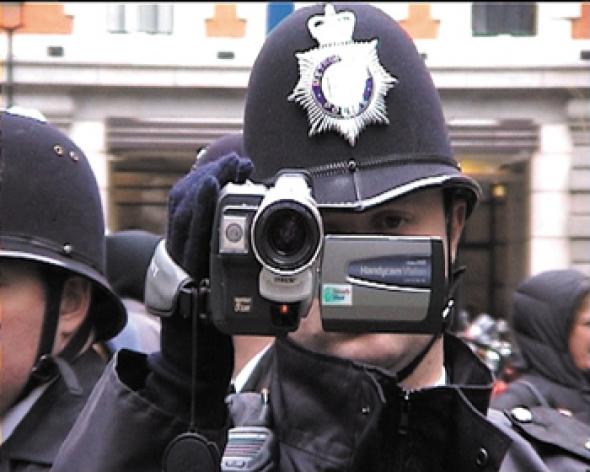Looking Inward, Finding Nothing
After spending Mayday confined in London’s Oxford Circus with other enemies of the British state, Shane Brighton asks if it’s time for anti-globalisation protestors to sidestep the media’s obsession with public order and focus on education and informing.
The depressed torpor afflicting those inside the police corrals which ended the Mayday protest may well have been the effect of hours of cold and confinement. To me it felt like a physiological reaction to the protest itself.
Travelling home from central London I found myself wondering less about what had or hadn’t been achieved than whether anything really happened at all. Catching the late news didn’t help much. Police helicopter footage neatly expressed the mainstream media’s focus, simply showing the extent of the protest and its containment. In the following days much was made of the police strategy which simultaneously turned a political demonstration into a contest over space and announced its own "victory" by closing in the "opposition". Other commentators announced the marchers’ victory in the contest over perceptions, the undermining of media cliché through humour and ‘subversively passive’ tactics. Nobody (unless I blinked and missed it) said much about globalisation or the domestic problems associated with neo-liberal economics.
Accepting, as most of those involved seemed to, that what was important was less what occurred than the way it was perceived and represented, the Mayday protest was a fait accompli of sorts. The media’s search for violent spectacle was largely foiled by the protestors’ scrupulous self-policing. In fact, the biggest display of collective passion I witnessed was the mass booing of a few individuals who, tired of being boxed in, started bashing at shop windows. But isn’t there something missing in all this? It’s one thing for liberal journalists to set the agenda around the question of whether the protest is ‘peaceful’ (and therefore ‘legitimate’) or ‘violent’ (and therefore ‘illegitimate’), but why should this be uncritically accepted by anyone else?
Shouldn’t protest do more than reassure people? What about legitimating protest through informing and educating people about the things that mainstream media, for the most part, exclude – like the specific social and environmental effects of globalisation? What about taking the whole thing out of the juridical discourse of public order into a more authentically political one, the aim of which being to provoke people to ask questions about the way we are governed?
On Mayday the police created populous, neatly defined political spaces in full view of the nation’s media, spaces which were then effectively de-politicised by those inside them. There was no attempt to initiate mass discussion, to debate strategic activism or disseminate information. The only collective response to the police tactic of confinement seemed to be drumming and dancing – fine if you want to get E’d up and have fun, not so fine for publicising what’s happening in the shantytowns of Manila and Sao Paulo.
Shane Brighton <shane.brighton AT virgin.net> is a Doctoral Candidate and Teaching Assistant at the University of London.
Mute Books Orders
For Mute Books distribution contact Anagram Books
contact@anagrambooks.com
For online purchases visit anagrambooks.com








